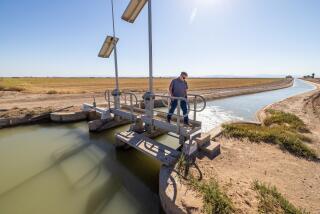Get It Out in the Open
Congress demands to know more about reports that the Westlands Water District and the U.S. Bureau of Reclamation have negotiated a secret deal that would substantially sweeten the federal subsidies already enjoyed by the giant irrigation district in the San Joaquin Valley. It also is getting into position to stop the deal, as it certainly should, if the reports are true.
Westlands is the Fresno-based agency that contracts with the Bureau of Reclamation for about 1 million acre-feet of water a year from the Central Valley Project (more water than the City of Los Angeles uses in a year).
The report that provoked Sen. William Proxmire (D-Wis.) and three colleagues to demand information has the bureau agreeing to sell Westlands water for an additional 150,000 acres of cropland in the Westplains area for about $8 an acre-foot--roughly half the price that the federal government now gets for such water, and far less than the cost of delivery. The deal apparently is before Interior Secretary Donald P. Hodel for signature.
Up to now, federal officials have claimed that Congress never authorized the use of Central Valley Project water in Westplains. Also, the deal apparently includes a refinancing of irrigation drainage facilities so that Westlands’ big agribusiness members will not be forced to bear the entire payment as Congress intended.
Westlands is the area that has been plagued with the runoff of selenium in its irrigation discharges into Kesterson Reservoir, killing or deforming waterfowl in a national wildlife refuge.
Water service to the Westplains addition to the irrigation district has been in dispute for two decades. In the interim, the Bureau of Reclamation has provided cheap surplus water to Westplains farmers on a year-to-year basis. Westlands officials claim that the region should receive the water under long-term contract without having to get additional authority from Congress. When the Interior Department under Secretary James G. Watt threatened to cut off the water, the irrigation district sued the government to enforce its claim. A special Interior Department task force investigated the situation in 1977, and it concluded that Westplains did not have a right to the water.
The task force proposed that a number of reclamation reforms be enacted before the Bureau of Reclamation signed a new or amended contract with the farmers to serve the region. One of the recommendations was that all water contract negotiations be open to the public. The task force finding has been accepted by every secretary of interior up to now.
If Hodel were to sign a contract, it would go to federal court for ratification. The agreement is said to resolve every dispute in Westlands’ favor.
It is a good thing that Congress is on the case. This is the wrong time and the wrong manner for such a deal. In this era of reclamation reform, federal project customers should pay a more realistic price for their water, not less. And any such agreements should be negotiated openly, not in secret.
Proxmire’s demand and another action by the House Appropriations Committee should get the matter out in the open where it belongs. The committee would block funds to carry out any agreement that Interior might reach with Westlands on the 150,000 acre-feet of disputed water.
Once the agreement is public, Congress and the people can render a judgment on decisions involving hundreds of millions of dollars of public funds and a massive amount of precious water.
More to Read
Sign up for Essential California
The most important California stories and recommendations in your inbox every morning.
You may occasionally receive promotional content from the Los Angeles Times.










